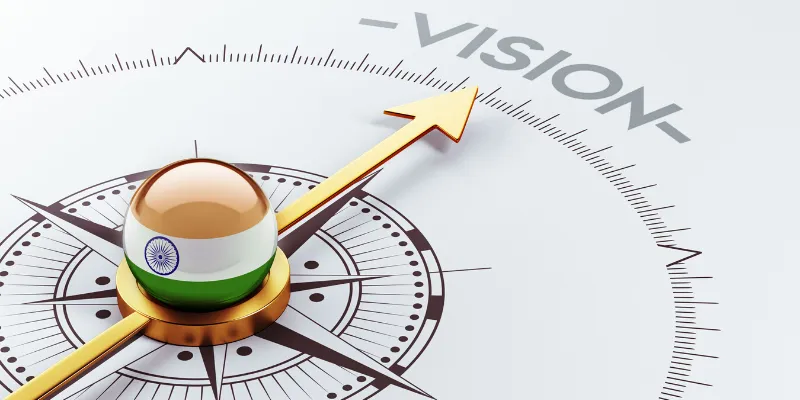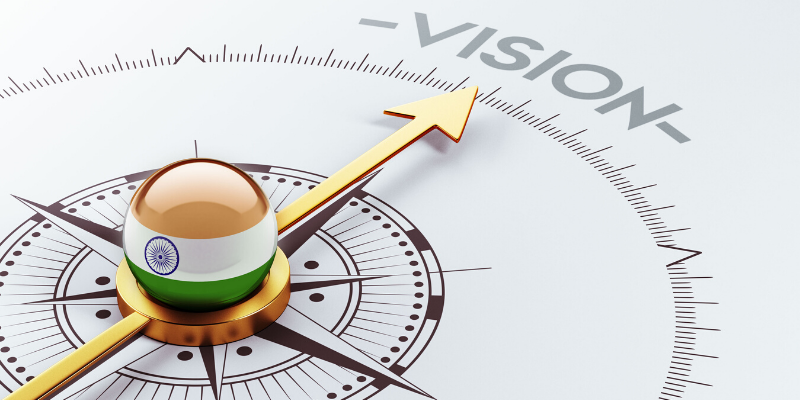What must India do to be a 21st century world power?
A look at why reforms are required in the world's financial and governance systems and goals that India should work towards in this changing world order.
After spending the last several weeks dealing with the coronavirus crisis, the Indian government has started refocusing on its development agenda. While rolling out his plan for MSMEs, Minister Nitin Gadkari highlighted the importance of import substitution as a key driver of innovation that could enable India to be a Rs 350 lakh crore ($5 trillion) economy by 2024. These key points are wonderful to hear for any Indian.
But for India to realise its ambition to be a 21st century world power, the strategies that are used to engage with foreign countries must evolve. In this article, we make a case for why reforms are required in the world's financial and governance systems, then we articulate the specific goals that India should work towards in this changing world order and finally conclude by articulating engagement strategies with foreign countries.

Superpower Financial Woes
The extent of the current crisis can be compared only to the severe economic crises that the world experienced in the early 20th century, 75-100 years ago. The US economy, perhaps the most relevant to the rest of the world due to the country's military strength and tentacles in the global financial system, is currently in dire straits.
The US had a historic 30 million unemployment claims in the last 6 weeks. The energy sector, a big part of its economy, is in a total disarray due to the discord among various oil producing countries. The frailties of its expensive and ineffective healthcare system have been exposed due to the manner in which it handled the COVID-19 pandemic.
The US government has passed a $2 trillion coronavirus bailout package and the Federal Reserve has promised unlimited bailouts for toxic financial assets like junk bonds and ill-managed companies. For perspective, the financial package rolled out by the India government till date is about $16 billion and is not expected to cross $60 billion. Yet, the US stock market indexes have already scaled the highs that they first achieved in early-2018.
The disconnect between the US economy and stock markets has been caused by long-standing structural issues in its financial and regulatory system. Since the weaknesses of this boom-bust system have been harmful to other countries for several decades, it is time for the rest of the world to take action to contain this issue.
Issues in World's Governance Systems
The primary pillars for the world's governance are the UN, the IMF and the World Bank — all of which are structured to further the West's agenda. The West, which is home only to 12% of the world's population, constitutes 60% of the permanent membership of the five-member UN Security Council, the most powerful body on matters of world peace and security, including collective action against ill-behaving countries.
While the World Bank and the IMF are meant to serve the economic interests of poor countries and countries in distress, their de facto agenda has been to promote the economic interests of the West.
Since the demise of the USSR in the early 1990's, the US has misused its position of being the sole superpower to a very large extent. Most countries, including several western countries, have been at the receiving end of blatant misuse of the US’ global-scale digital monopolies and have suffered from its use of sanctions against any country that doesn't fit its definition of an ally. Most of the wars across the world have been initiated by the US. All of the above have caused serious imbalances in the world's governance.
India as a World Power
On several occasions since assuming the office, Foreign Minister S. Jaishankar expressed India's aspiration to be one of the poles in a multipolar world order. This is an aspiration that India and all Indians deserve.
As a major racial and cultural group (one of every six humans is an Indian), a world civilisation, a contributor to the world's innovations, and a major 21st century economy, India's wisdom and its independent voice will provide a much-needed balance in world politics.
India will need to work towards specific goals in order to achieve the status of a world power.
1. India should become a permanent member of the UN Security Council in a short timeframe, perhaps within a year. The least disruptive way to accomplish this is by swapping one of the three Western powers - the US, the UK and France - with India, the latter two of which are increasingly irrelevant on the world stage.
2. The IMF and the World Bank must be revamped with two primary criteria:
a) the opportunity for leading the organizations must be rotated among India, China, the US, Russia and two or three other countries such as Germany and Japan.
b) the driving philosophy must be to promote market-based economies, sustainability, infrastructure development and a respectable living for all of the world's citizens.
3. India should become a major industrial and technology power. Development of indigenous technologies should play as important a role as technology transfer from other countries. Foreign companies must be encouraged to participate in India's growth but partnering with Indian-owned companies and technology transfer must be the primary criteria for who gets welcomed and incentivised by the Indian system.
4. Indians should keep most of the benefits deriving from India's growth. The existing models for financing such as venture capital/FPI/FII/FDI are conducive for foreign entities to take a big chunk of the benefits. Foreign funding should be directed towards the development of infrastructure, while Indian funds should be used for the development of high-growth tech companies and industry.
Indian banking, world-class industry veterans and subject matter experts (SMEs) should be brought together under the auspices of an India Innovation Fund which is structured to promote India-first entrepreneurs and businesses, with strong checks and balances against corruption and cronyism.
5. A foreign company that collects data from India, directly on its own or indirectly through its Indian subsidiary or an Indian partner, must replicate all of their databases in India and provide India the same level of access as their country of origin. This will be a good stopgap measure until new technical and business models for the internet emerge.
6. The Indian rupee must be one of the world's top four reserve currencies. This will not only symbolise India's economic relevance to the world, but also result in real economic benefits. It will also protect India from antagonistic actions from other countries like imposition of sanctions.
7. India must become a member of the Nuclear Suppliers Group (NSG). This will advance India's security interests because group members are allowed access to nuclear materials and advanced nuclear technologies from supplier nations. Also, India will be able to benefit commercially with the freedom to export civilian-use nuclear equipment.
Execution Strategies
A key prerequisite for realisation of India's ambitions will be to maintain peace with its neighbours. As long as border-related issues take up a significant amount of the mindspace of Indians, it will be very hard to focus on a productive 21st century agenda. So, we advocate status quo agreements with all border countries, with China in particular, that all borders will remain as-is for the next 50-100 years.
India's primary strength is its growth trend for the next few decades. Foreign countries desperately want to share the benefits of this growth and hence this should be the main source of leverage for India's dealings with other countries.
Any country's access to the Indian system i.e., ability to offer products & services, ability to invest in Indian companies/stock markets/infrastructure should be based upon how much that country supports India's strategic goals.
India should use a carrot-and-stick scheme for every country that it deals with. The carrot is access to India's markets and investments, and the stick is no access. Rewards should flow to countries that support India's strategic goals.
Rather than past trade metrics, the privilege to be able to access India's crown jewels namely, Indian markets and investment opportunities, should take centrestage in the foreign ministry's dialogue with their peers.
Being disciplined and having a laser-like focus on these strategies is sure to yield rich dividends for India in the 21st century.
(Edited by Apoorva Puranik)
(Disclaimer: The views and opinions expressed in this article are those of the author and do not necessarily reflect the views of YourStory.)












